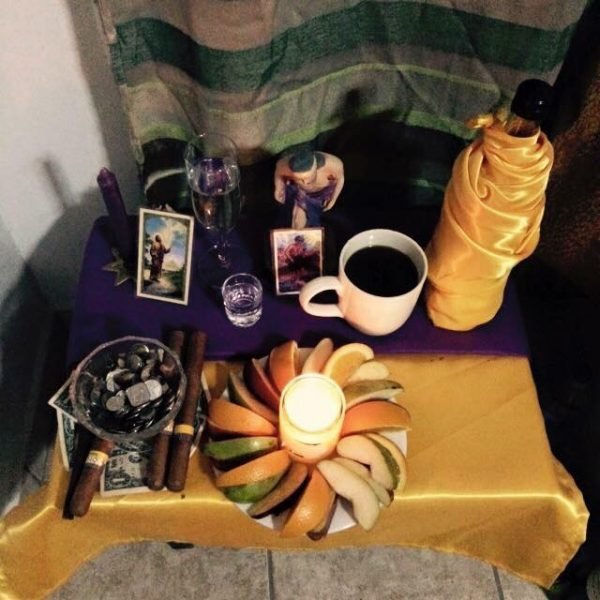This is the third post in my Haitian Vodou series, if you know nothing about Haitian Vodou, I recommend reading this one first: Haitian Vodou - History, Beliefs, and Practices
Introduction
Papa Legba is intermediary between humanity and other Loas. He stands at a spiritual crossroads and gives or denies the permission to speak with other spirits. He also opens and closes the gate to the spirit world.
Besides giving permission, he provides the means of communication with other spirits. While most of the Loa don’t speak the same languages as their followers, Papa Legba is eloquent in all the languages. In most cases, he is required as a translator in communication with the other spirits. Because of Papa Legba's role as the one who opens the gateway to the spirit world and his ability to translate any language he is always the first and the last spirit invoked in any ceremony.

Veve of Papa Legba drawn and vectorized by Chrkl
Rada and Petro
Papa Legba is a member of Rada nanchon of the Loa. Rada family has one of the oldest origins of all Loa families. They can be traced back to the Yoruba people and the Fon people of Dahomey, Africa. They come from The Old Continent, and they are the group which includes beneficial spirits from Africa. Rada is the guardians of morals and principles.
Opposed to Rada Loas, is Petro nanchon of Loa. They are a newer generation of spirits which originated in Haiti during the time of slavery. As a result of being created in those harsh times, they are a group consisting of more aggressive, angry and fierce spirits. They are connected to Rada nanchon as most of the Rada Loas have their counterparts in the Petro family. Some view those counterparts as individual entities, while others see them as different aspects of the same spirit.
Rada and Petro are often misinterpreted as the good and the evil family. That is not the truth as Rada Loas can be invoked for malevolent purposes, while Petro Loas can be invoked for benevolent purposes.
More accurate opposition of the two families could be described through Rada Loas as cool and Petro Loas as hot. Rada Loas are generally trustworthy, collected and benevolent. They are concerned mainly with assuring the well-being of their devotees.
Petro Loas are angry, fierce and occasionally aggressive. They are often invoked in the eve of battle to provide one with both physical strength and adequate mindset to go through with their intentions. Such characteristics attributed to the Petro Loa are the consequence of the time of their origin. They are a much younger family than Rada. They were created during the harshest times for the African people, those spent in slavery and their anger was something slaves could relate to in unimaginable conditions they had to suffer.
Each Loa has his own songs and rhythms, this one is dedicated to Papa Legba
Papa Legba
Papa Legba is imagined as an old man with a straw hat, plain clothing, and a corncob pipe. He walks with a limp, leaning on a crooked cane, accompanied by his dogs. His favorite colors are red and black, his number is three and his day of the week is Monday.
Although he might seem as a frail old man his looks are deceiving, as he is immensely powerful. He doesn’t limp because he is crippled, he limps because his feet are in different worlds. One of his feet is in the spirit world while the other is in the material world. The cane which he leans against is the gateway between Earth and heaven, and nothing can come to pass unless Papa Legba opens the gateway.
Papa Legba is the guardian of crossroads and entrances. Meaning of crossroads is not limited to the roads that cross here. When different cultures, ideas or strategies cross paths they fall under Papa Legba's domain of power. Each crossroad in its metaphysical meaning is governed by him.
Every crossroad offers a few roads for a person or a group to choose, some roads are fortunate and some are less so. The well-paved road can trick any traveler, and thus Papa Legba as the master of all crossroads is also the trickster spirit among Loas.
Papa Legba, open the door
Your children await
Open the door Papa Legba
So that I may pass
When I return, I will thank the loa
I already mentioned he is a great communicator. But as a trickster spirit who loves a good laugh, he is also a brilliant miscommunicator fond of a good joke. As a master linguist, he loves to use riddles and paradoxes. He is known for employing all sorts of plays on the meaning behind his words. When he translates communication between humanity and other loa he enjoys playing tricks with messages they send. He does so rein in the ego of devotees and teach them to listen carefully. Such tricks usually conceal great wisdom you might glimpse if you listen carefully. If you fall for the trick, consequences are rarely sinister, as Papa Legba is good-natured.
Even though Papa Legba is the greatest trickster among spirits his benevolence earns him a place among the most cherished Loa. Papa Legba is also treated with great respect both for his position and his overall wisdom.
He requires that wisdom to fulfill another of his many roles. Besides being smiling master linguist and trickster, who likes to play games and laugh, Papa Legba rules over both destiny and uncertainty. He has the power of removing any obstacle and providing new opportunities. He can as easily shut the path that leads one to success. Good thing is that Papa Legba is forgiving, he knows that no-one is perfect and he will give another opportunity to those who make a mistake.
Despite his high position among spirits, Papa Legba is modest. He does not demand a lot in the form of service to him. A cup of black coffee, some tobacco for his pipe and pennies or candies left on crossroads will make him happy. Those who wish to indulge him further can give him additional offerings like coconuts, palm oil, and rum. Lighting a white or yellow candle in his name, and leaving some pennies and candy in corners of the house will also make Papa Legba satisfied.

Papa Legba exists to remind us that looks easily deceive. He is here to remind humanity that there is merit to be earned in helping a plain looking beggar and that there just might be wisdom hidden behind his seemingly trivial words. There might be a lesson hidden in the persona of Papa Legba, which every one of us should consider next time he is approached by a smiling vagabond.
Sources of information:
- Encyclopedia of African Religion - Molefi Kete Asante, Ama Mazama
- Afro-Caribbean Religions: An Introduction to Their Historical, Cultural, and Sacred Traditions - Nathaniel Samuel Murrell
- Wikipedia
- My own knowledge for parts of which I am not certain where exactly it came from (I read a lot and forget the names of people and books even more)
Previous articles in the Vodou series:
